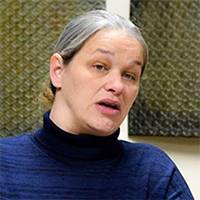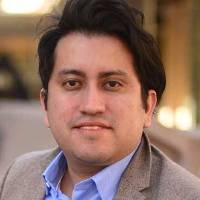Texas State University | March 1, 2022
On Feb. 24, 2022, Russia launched a large-scale, unprovoked invasion of Ukraine, its neighbor to the southwest. Hundreds of thousands of Ukrainians have fled the country as their military and civilian militia are defending their homeland. Russia has bombed Kharkiv, Ukraine’s second largest city, and is poised to strike Kyiv, the nation’s capital. Ukraine has seen hundreds of its citizens killed since the invasion began. The death toll of Russian armed forces is in the thousands.
As part of the Department of History’s “History in the Making Series,” historians of Russia, contemporary Europe, diplomacy, and US military interventionism met on Feb. 28 to discuss the crisis in Ukraine.
Several students enrolled at Texas State are from Ukraine and Russia. They are valued members of our university community. This is a difficult and frightening time for them as they watch the crisis unfolding abroad. The International Student and Scholar Services (ISSS) office, as well as the Graduate College and other university departments, have reached out to the students to check in and provide information about support services available, including the Counseling Center and the international student insurance telehealth support. As any additional aid programs become available from the federal government, ISSS will remain in contact with eligible students to provide assistance.
- “This is the biggest catastrophe in the region in decades. I think it remains to be seen how bad it's going to get. It's obviously a catastrophe for the Ukrainian people who are under Russian aerial bombardment as we're speaking, who are the victims of an invasion, but it's also a tragedy and a catastrophe for the Russian people. I think that that is something that gets overlooked in the West.” - Dr. Louis Porter
- “I think it's important to put this in terms of what Russia has been doing globally the last 10 to 15 years. It has very explicitly been anti-democratic. It has interfered in elections, both in the United Kingdom and the United States, and has lent money to far right-wing parties in France, really trying to make its influence known there. Also, it has tried to create a divided house within Europe. I think that's where we are in this moment… thinking about Europe having gone through BREXIT, having questions about NATO, all trying to figure out how do we come together in light of this new threat.” - Dr. Louie Dean Valencia
- “The United States is actually providing satellite images to help the Ukrainian Government see where Russian troops are, and a lot of other intelligence. And the United States is sending in stinger missiles in very large numbers now. So, the idea is to try to help Ukraine get control of the air, but that forces escalating the conflict as well.” - Dr. Ellen Tillman
How you can help
This collection of nonprofits is based on the Washington Post, “Here’s how Americans can donate to help people in Ukraine,” and organizations recommended by a Ukrainian Ph.D. student at Texas State.
- The National Bank of Ukraine has created an account where people from around the world can donate to the country’s military.
- Ukrainian American Coordinating Council is a non-partisan non-profit uniting Ukrainian American organizations in advocating for over Americans of Ukrainian descent.
- Voices of Children, a charitable foundation based in Ukraine, is providing aid to children and families, even helping with evacuations.
- Razom for Ukraine, which launched efforts to build a stronger democracy in the country, says it’s now focused on purchasing medical supplies and other tactical medicine items.
- Care, the international humanitarian organization, is providing food, water, and more to families in Ukraine fleeing violence.
- Sunflower of Peace is a small nonprofit that launched a fundraiser for first-aid medical tactical backpacks, including bandages and medicines, that can save up to 10 people.
- Come Back Alive, established in 2014, is the largest foundation providing support to the Ukrainian Armed Forces.
- Save the Children says that $50 can prevent three children from going hungry for a month and $150 can provide warm blankets for 30 children.
Panelists

Dr. Louis Porter
Dr. Porter's scholarship focuses on Russia, Eurasia, and Eastern Europe. His current book project, Reds in Blue: The Soviet Encounter with International Organizations, draws on unused archival material in Russia, Western Europe, and the U.S. to provide the first comprehensive history of Soviet involvement in a noncommunist international organization during the Cold War.

Dr. Ellen Tillman
Dr. Tillman studies military history, US-Latin American relations, race relations, and military interventions and occupations. She is the author of Dollar Diplomacy by Force: Nation-Building and Resistance in the Dominican Republic.

Dr. Louie Dean Valencia
Dr. Valencia's work focuses on contemporary Europe, the history of fascism/antifascism, collective memory, and digital culture and methods. He is the author of Antiauthoritarian Youth Culture in Francoist Spain: Clashing with Fascism and the editor of Far-Right Revisionism and the End of History: Alt/Histories.

Dr. Elizabeth Bishop
Dr. Bishop's studies the Middle East, North Africa, diplomacy, and the global Cold War. She has published numerous articles on the subject.
Share this article
For more information, contact University Communications:Jayme Blaschke, 512-245-2555 Sandy Pantlik, 512-245-2922 |
